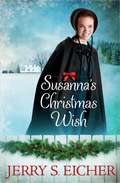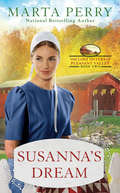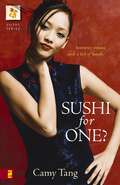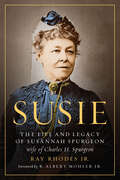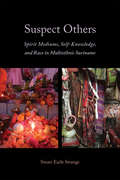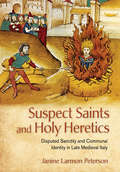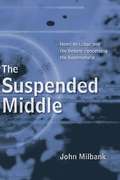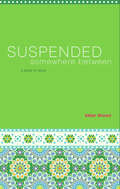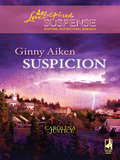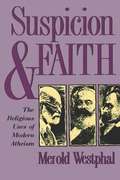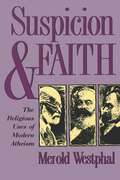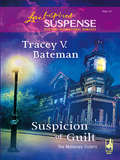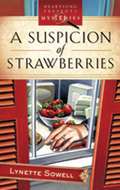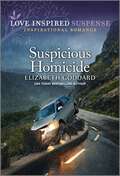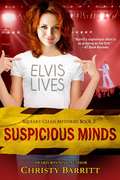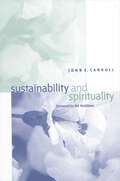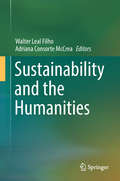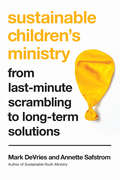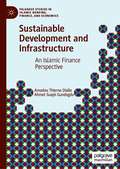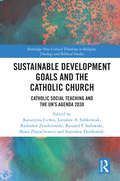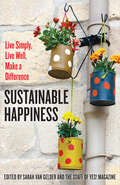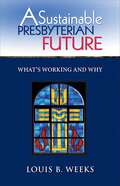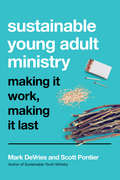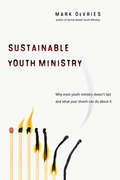- Table View
- List View
Susanna's Christmas Wish
by Jerry S. EicherFans will be delighted by this peek at an Amish Christmas, complete with the romantic wish of Susanna Byler to spend the holidays with the man of her dreams. But who is the man of her dreams? Is it the competent but plain Amish man she married after having her heart broken ... . or is it her first love -- a ma who left their community to live with the Englisha with whom she has recently had an unexpected encounter -- and who wants her back in his life?
Susanna's Dream (Lost Sisters of Pleasant Valley #2)
by Marta PerryAs young girls, three Amish sisters were separated and told nothing about each other. When the long-held secret of their parentage came to light many years later, two of the grown women reconnected. Now they reach out to the third... <P><P> Susanna Bitler's life is in complete turmoil. Still reeling from the death of her mother, she is further disheartened when her business partner hints that she is going to quit the gift shop they run together in a town near Pleasant Valley. But the biggest revelation is yet to come. <P> Grateful for their own hard-won relationship, Lydia Beachy and Chloe Wentworth are eager to reveal themselves to Susanna as her long-lost sisters. But their news utterly distresses Susanna, who is heartbroken to learn that the woman she's been mourning was not actually her mother. Despite Lydia and Chloe's best efforts to make amends, Susanna resolves to keep them at arm's length. It may take a force of nature to sweep away her fears. Will that storm demolish all that the three women most value...or unite them in bonds of deep and abiding affection?
SUSHI for ONE? (Sushi Series #1)
by Camy TangLex Sakai never had time for dating until her crafty grandmother insisted she bring a date to her cousin's wedding. The always-in-control Lex uses Ephesians to compile a huge list of traits for the perfect man ? but God seems to have a much more unlikely candidate in mind.
Susie: The Life and Legacy of Susannah Spurgeon, wife of Charles H. Spurgeon
by Ray Rhodes Jr.The definitive biography of Susannah Spurgeon.While many Christians recognize the name of Charles H. Spurgeon, the beloved preacher and writer, few are familiar with the life and legacy of his wife, Susie. Yet Susannah Spurgeon was an accomplished and devout woman of God who had a tremendous ministry in her own right, as well as in support of her husband. Even while dealing with serious health issues, she administered a book fund for poor pastors, edited and published her husband&’s sermons and other writings, led a pastor&’s aid ministry, wrote five books, made her home a hub of hospitality, and was instrumental in planting a church. And as her own writing attests, she was also a warm, charming, and fascinating woman. Now, for the first time, Susie brings this vibrant woman&’s story to modern readers. Ray Rhodes Jr. examines Susannah&’s life, showing that she was not only the wife of London&’s most famous preacher, but also a woman who gave all she had in grateful service to the Lord. Susie is an inspiring and encouraging account of a truly remarkable woman of faith that will delight Spurgeon devotees and fans of Christian biographies alike. &“I am writing in my husband&’s study, where he thought, and prayed, and wrote. Every inch of the place is sacred ground. Everything remains precisely as he left it. His books (now my most precious possessions), stand in shining rows upon the shelves, in exactly the order in which he placed them, and one might almost fancy the room was ready and waiting for its master. But oh! That empty chair! That great portrait over the door! The strange, solemn silence, which pervades the place now that he is no longer on earth! I kneel sometimes by his chair, and laying my head on the cushioned arms, which so long supported his dear form, I pour out my grief before the Lord, and tell Him again that though I am left alone, yet I know that &‘He hath done all things well&’…&”
Susie: The Life and Legacy of Susannah Spurgeon, wife of Charles H. Spurgeon
by Ray Rhodes Jr.The definitive biography of Susannah Spurgeon.While many Christians recognize the name of Charles H. Spurgeon, the beloved preacher and writer, few are familiar with the life and legacy of his wife, Susie. Yet Susannah Spurgeon was an accomplished and devout woman of God who had a tremendous ministry in her own right, as well as in support of her husband. Even while dealing with serious health issues, she administered a book fund for poor pastors, edited and published her husband&’s sermons and other writings, led a pastor&’s aid ministry, wrote five books, made her home a hub of hospitality, and was instrumental in planting a church. And as her own writing attests, she was also a warm, charming, and fascinating woman. Now, for the first time, Susie brings this vibrant woman&’s story to modern readers. Ray Rhodes Jr. examines Susannah&’s life, showing that she was not only the wife of London&’s most famous preacher, but also a woman who gave all she had in grateful service to the Lord. Susie is an inspiring and encouraging account of a truly remarkable woman of faith that will delight Spurgeon devotees and fans of Christian biographies alike. &“I am writing in my husband&’s study, where he thought, and prayed, and wrote. Every inch of the place is sacred ground. Everything remains precisely as he left it. His books (now my most precious possessions), stand in shining rows upon the shelves, in exactly the order in which he placed them, and one might almost fancy the room was ready and waiting for its master. But oh! That empty chair! That great portrait over the door! The strange, solemn silence, which pervades the place now that he is no longer on earth! I kneel sometimes by his chair, and laying my head on the cushioned arms, which so long supported his dear form, I pour out my grief before the Lord, and tell Him again that though I am left alone, yet I know that &‘He hath done all things well&’…&”
Suspect Others: Spirit Mediums, Self-Knowledge, and Race in Multiethnic Suriname (Anthropological Horizons)
by Stuart Earle StrangeSuspect Others explores how ideas of self-knowledge and identity arise from a unique set of rituals in Suriname, a postcolonial Caribbean nation rife with racial and religious suspicion. Amid competition for belonging, political power, and control over natural resources, Surinamese Ndyuka Maroons and Hindus look to spirit mediums to understand the causes of their successes and sufferings and to know the hidden minds of relatives and rivals alike. But although mediumship promises knowledge of others, interactions between mediums and their devotees also fundamentally challenge what devotees know about themselves, thereby turning interpersonal suspicion into doubts about the self. Through a rich ethnographic comparison of the different ways in which Ndyuka and Hindu spirit mediums and their devotees navigate suspicion, Suspect Others shows how present-day Caribbean peoples come to experience selves that defy concepts of personhood inflicted by the colonial past. Stuart Earle Strange investigates key questions about the nature of self-knowledge, religious revelation, and racial discourse in a hyper-diverse society. At a moment when exclusionary suspicions dominate global politics, Suspect Others elucidates self-identity as a social process that emerges from the paradoxical ways in which people must look to others to know themselves.
Suspect Saints and Holy Heretics: Disputed Sanctity and Communal Identity in Late Medieval Italy
by Janine Larmon PetersonIn Suspect Saints and Holy Heretics Janine Larmon Peterson investigates regional saints whose holiness was contested. She scrutinizes the papacy's toleration of unofficial saints' cults and its response when their devotees challenged church authority about a cult's merits or the saint's orthodoxy. As she demonstrates, communities that venerated saints increasingly clashed with popes and inquisitors determined to erode any local claims of religious authority.Local and unsanctioned saints were spiritual and social fixtures in the towns of northern and central Italy in the thirteenth and fourteenth centuries. In some cases, popes allowed these saints' cults; in others, church officials condemned the saint and/or their followers as heretics. Using a wide range of secular and clerical sources—including vitae, inquisitorial and canonization records, chronicles, and civic statutes—Peterson explores who these unofficial saints were, how the phenomenon of disputed sanctity arose, and why communities would be willing to risk punishment by continuing to venerate a local holy man or woman. She argues that the Church increasingly restricted sanctification in the later Middle Ages, which precipitated new debates over who had the authority to recognize sainthood and what evidence should be used to identify holiness and heterodoxy. The case studies she presents detail how the political climate of the Italian peninsula allowed Italian communities to use saints' cults as a tool to negotiate religious and political autonomy in opposition to growing papal bureaucratization.Open Access edition funded by the National Endowment for the Humanities
The Suspended Middle: Henri de Lubac and the Debate Concerning the Supernatural
by John MilbankThe Suspended Middle shows how such a claim entails a non-ontology suspended between rational philosophy and revealed theology, interweaving the two while denying them any pure autonomy from each other. As de Lubac's writings on the supernatural implicitly dismantled the reigning Catholic assumptions about Christian intellectual reflection, he met with opposition and even papal censure.
Suspended Somewhere Between: A Book of Verse (Busboys And Poets Ser.)
by Akbar AhmedThis collection spanning a half century of writing gives a front row seat to a world in turmoil—from the forbidding valleys and mountains of Waziristan in the tribal areas of Pakistan to the think tanks and halls of power in Washington, DC. And through it all, they carry the message of hope and compassion. Throughout the range of poems from introspective and reflective to romantic and emotive to historical and political exists the optimism and faith of a young man with confidence in the future in the midst of change and uncertainty.
Suspicion
by Ginny AikenFor years, Sheriff Hal Benson has been sweet on Meg Scott. But the tough lawman turns shy around the pretty pharmacist. When Meg is mugged one night while closing up, he runs to her aid. Even though it's out of his jurisdiction, he'll do anything in his power to keep her safe. But when drugs start going missing from her shop, Meg's in hot water with the police. She faces losing everything she's worked to achieve. And Hal must make a decision--defend Meg or condemn her. With an election looming, will he risk his future to save hers?
Suspicion and Faith: The Religious Uses of Modern Atheism
by Merold WestphalMarx, Nietzche, and Freud are among the most influential of modern atheists. The distinctive feature of their challenge to theistic and specifically Christian belief is expressed by Paul Ricoeur when he calls them the "masters of suspicion." While skepticism directs its critique to the truth or evidential basis of belief, suspicion asks two different, intimately intertwined questions: what are the motives that lead to this belief? and what function does it play, what work does it do for the individuals and communities that adopt it. <P><P>What suspicion suspects is that the survival value of religious beliefs depends on satisfying desires and interests that the believing soul and the believing community are not eager to acknowledge because they violate the values they profess, as when, for example, talk about justice is a mask for deep-seated resentment and the desire for revenge. For this reason, the hermeneutics of suspicion is a theory, or group of theories, of self-deception: ideology critique in Marx, genealogy in Nietzsche, and psychoanalysis in Freud. <P><P>Suspicion and Faith argues that the appropriate religious response ("the religious uses of modern atheism") to these critiques is not to try to refute or deflect them, but rather to acknowledge their force in a process of self-examination--and this for two reasons. First, while these critiques are not, as Marx, Nietzsche, and Freud tend to suppose.
Suspicion and Faith: The Religious Uses of Modern Atheism
by Merold WestphalAvailable in a new digital edition with reflowable text suitable for e-readersMarx, Nietzche, and Freud are among the most influential of modern atheists. The distinctive feature of their challenge to theistic and specifically Christian belief is expressed by Paul Ricoeur when he calls them the "masters of suspicion." While skepticism directs its critique to the truth or evidential basis of belief, suspicion asks two different, intimately intertwined questions: what are the motives that lead to this belief? and what function does it play, what work does it do for the individuals and communities that adopt it.What suspicion suspects is that the survival value of religious beliefs depends on satisfying desires and interests that the believing soul and the believing community are not eager to acknowledge because they violate the values they profess, as when, for example, talk about justice is a mask for deep-seated resentment and the desire for revenge. For this reason, the hermeneutics of suspicion is a theory, or group of theories, of self-deception: ideology critique in Marx, genealogy in Nietzsche, and psychoanalysis in Freud.Suspicion and Faith argues that the appropriate religious response ("the religious uses of modern atheism") to these critiques is not to try to refute or deflect them, but rather to acknowledge their force in a process of self-examination.
Suspicion of Guilt
by Tracey V. BatemanTheft, flood, fire--someone was trying to destroy the home for troubled girls that Denni Mahoney had worked so hard to build. It was obvious her neighbors didn't want them around, but could the girls' pasts be the source of even greater menace?As the detective on the case, Reece Corrigan had to figure out what was going on at Mahoney House--and keep the unnervingly attractive Denni safe. And though the attacks hadn't been successful, Reece feared it was only a matter of time before the perpetrator's focus shifted from the house...to Denni herself.
A Suspicion of Strawberries
by Lynette SowellWhen Charla Rae Thacker and her bridesmaids show up at Andi's soap shop in Greenburg, Tennessee, for a morning of pre-wedding pampering, Andi bends over backwards to make it a pleasant experience for them all. But then Charla keels over and dies from anaphylactic shock after she uses Andi's blended cherries jubilee facial scrub. Andi suspects sabotage and murder when she discovers strawberries - a lethal allergen for Charla - in the scrub. Now, Andi must save her business and her reputation.
Suspicious Homicide (Honor Protection Specialists #4)
by Elizabeth GoddardThe mountains are full of secrets… Uncovering them could be deadly When Finnley Wilbanks is run off a mountainside road, it confirms her worst fears—her father was murdered. With her life hanging in the balance, she turns to bodyguard and investigator Caine Honor for protection. As they work together to solve the mystery behind her father&’s death, danger stalks their every move. And keeping Finnley alive long enough to find answers might be Caine&’s hardest mission yet.From Love Inspired Suspense: Courage. Danger. Faith.Honor Protection Specialists Book 1: High-Risk RescueBook 2: Perilous Security DetailBook 3: Deadly SabotageBook 4: Suspicious Homicide
Suspicious Minds: A Novel
by Christy BarrittRock and roll may never die, but the King is definitely dead . . . again. To pay off some bills, crime scene cleaner Gabby St. Claire takes a job doing mold remediation, but she finds a surprise in the dilapidated home's crawlspace: Elvis, dead as a doornail and still wearing his blue suede shoes. How could she possibly keep her nose out of a case like this? A sequel to the popular novel Hazardous Duty.
Sustainability and Spirituality
by John E. CarrollThis groundbreaking book explores the inherent interconnectedness of sustainability and spirituality, acknowledging the dependency of one upon the other. John E. Carroll contends that true ecological sustainability, in contrast to the cosmetic attempts at sustainability we see around us, questions our society's fundamental values and is so countercultural that it is resisted by anyone without a spiritual belief in something deeper than efficiency, technology, or economics. Carroll draws on the work of cultural historian and "geologian" Thomas Berry, whose eco-spiritual thought underlies many of the sustainability efforts of communities described in this book, including particular branches of Catholic religious orders and the loosely organized Sisters of the Earth. The writings of Native Americans on spirituality and ecology are also highlighted. These models for sustainability not only represent the tangible link between ecology and spirituality, but also, more importantly, a vision of what could be.
Sustainability and the Humanities
by Walter Leal Filho Adriana Consorte McCreaThis book explores the strong links between sustainability and the humanities, which go beyond the inclusion of social sciences in discussions on sustainability, and offers a holistic discussion on the intellectual and moral aspects of sustainable development. The contributions from researchers in the fields of education, social sciences, religion, humanities, and sustainable development fulfill three main aims:They provide university lecturers interested in humanities and sustainable development with an opportunity to present their work;foster the exchange of information, ideas and experiences acquired in the execution of teaching and research; anddiscuss methodological approaches and projects that provide a better understanding of how the humanities can contribute to the debate on sustainable development. Prepared by the Inter-University Sustainable Development Research Programme and the World Sustainable Development Research and Transfer Centre, the book reiterates the need to promote integrated approaches to sustainable development. Including practice-based lessons learnt that can be replicated further, it is a valuable resource for scientists and practitioners working in the humanities and sustainable development.
Sustainable Children's Ministry: From Last-Minute Scrambling to Long-Term Solutions
by Mark DeVries Annette SafstromSustainable Children’s Ministry
Sustainable Development and Infrastructure: An Islamic Finance Perspective (Palgrave Studies in Islamic Banking, Finance, and Economics)
by Amadou Thierno Diallo Ahmet Suayb GundogduMost books on Islamic finance and development issues are written from an academic perspective. Although academic reflection is key for future direction, dissatisfaction with previous development efforts, as evidenced by their lack of sustainability, suggests the need for a different type of review. Development work is complex and requires a detailed and transparent approach in order to ensure a cogent resolution for potential long-term issues. Each intervention area requires specific elaboration for meaningful impact. The perfect solution for one sector might be detrimental for another. Islamic finance, with its strict Riba restrictions, rules, and other checks and balances, is a good fit for infrastructure development in pursuit of sustainable development. When it comes to sustainable development, this book argues, Islamic finance has the tools to intervene for maximum impact. However, the issue of sustainability is not only related to Islamic finance; more policy discourse is needed. This requires guidance from the principles of Islamic economics, as well. This book discusses infrastructure development vis-à-vis sustainable development, drawn from decades of real-life development banking experience, and proposes impactful intervention methods based on wisdom from Islamic economics and finance.
Sustainable Development Goals and the Catholic Church: Catholic Social Teaching and the UN’s Agenda 2030 (Routledge New Critical Thinking in Religion, Theology and Biblical Studies)
by Katarzyna Cichos Jaros 322 Aw A. Sobkowiak Ryszard F. Sadowski Beata Zbarachewicz Rados 322 Aw Zenderowski Stanis 322 Aw Dzieko 324 SkiThis book identifies both the consistencies and disparities between Catholic Social Teaching and the United Nation’s (UN) Sustainable Development Goals (SDGs). With Pope Francis’ Laudato si’ encyclical, Catholicism seems to be engaging more than ever with environmental and developmental concerns. However, there remains the question of how these theological statements will be put into practice. The ongoing involvement of the Catholic Church in social matters makes it a significant potential partner in issues around development. Therefore, with the use of the comparative method, this book brings together authors from multiple disciplines to assess how the political and legal aspects of each of the UN’s 17 SDGs are addressed by Catholic Social Teaching. Chapters answer the question of how the Catholic Church evaluates the concept of sustainable development as defined by the Agenda 2030 Goals, as well as assessing how and if it can contribute to shaping the contemporary concept of global development. Examining the potential level of cooperation between the international community and the Catholic Church in the implementation of the Agenda 2030 Goals, this volume will be of keen interest to scholars of Catholic Studies, Religious Studies and the Sociology of Religion, as well as Environmental Studies and Development Studies.
Sustainable Happiness: Live Simply, Live Well, Make a Difference
by Sarah Van GelderWe're bombarded by messages telling us that bigger and better things are the keys to happiness—but after we pile up the stuff and pile on the work hours, we end up exhausted and broke on a planet full of trash. Sarah van Gelder and her colleagues at YES! Magazine have been exploring the meaning of real happiness for eighteen years. Here they offer fascinating research, in-depth essays, and compelling personal stories by visionaries such as Annie Leonard, Matthieu Ricard, and Vandana Shiva, showing us that real well-being is found in supportive relationships and thriving communities, opportunities to make a contribution, and the renewal we receive from a thriving natural world. In the pages of this book, you'll find creative and practical ways to cultivate a happiness that is nurturing, enduring, and life affirming.
A Sustainable Presbyterian Future
by Louis B. WeeksIn this study of the Presbyterian Church (U. S. A. ), Louis Weeks examines the present state of the denomination and how congregations can grow in faith through the current time of transition in the church. He considers markers of Presbyterian identity, new ways of connecting and faith development, and defining qualities of the church. Recognizing that many congregations are changing in different ways, Weeks includes case studies of congregations and interviews with leaders of local congregations and denominational leaders to explore aspects of Presbyterian faith and life that are viable and necessary for the future.
Sustainable Young Adult Ministry: Making It Work, Making It Last
by Mark DeVries Scott PontierYoung adult ministry scares us.programsSustainable Young Adult Ministry
Sustainable Youth Ministry: Why Most Youth Ministry Doesn't Last and What Your Church Can Do About It
by Mark DeVrieshelps senior pastors and search committees create a realistic job description for a youth pastorprovides tips for making wise hiring decisionsequips youth pastors to build a strong volunteer teamoffers creative solutions to help youth pastors set and keep boundariesgives a road map for navigating church politicsand morecan
